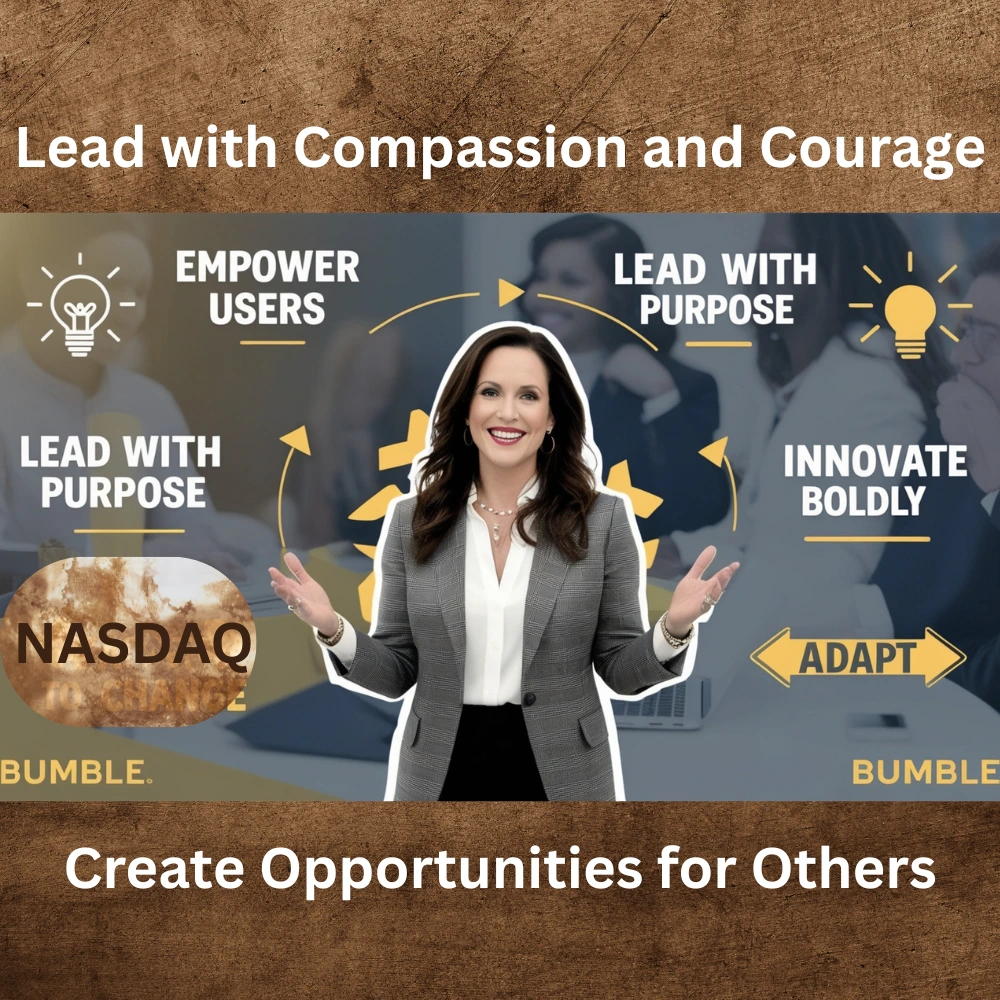Introduction
Whitney Wolfe Herd is a name that has become synonymous with boldness, innovation, and leadership in the modern tech world. As the founder of Bumble and a former co founder of Tinder, she’s made a lasting mark on the dating app industry and beyond. What makes her journey particularly fascinating is not just the success of her ventures, but the courage and strategy behind her decisions. From standing up against toxic corporate cultures to building a female first tech empire, her moves are redefining what leadership looks like in the 21st century.
Who Is Whitney Wolfe Herd?
Whitney Wolfe Herd is a trailblazing tech entrepreneur best known as the founder and CEO of Bumble, the women first dating app that revolutionized online relationships by letting women make the first move. Born in 1989 in Salt Lake City, she started her tech career as a co founder of Tinder before launching Bumble in 2014 after a public exit from Tinder. Under her leadership, Bumble expanded globally and introduced new features like Bumble BFF and Bumble Bizz. In 2021, she became the youngest self made female billionaire after taking Bumble public. Whitney Wolfe Herd is highly respected for her courageous leadership, dedication to creating safe, empowering online platforms, and her strong advocacy for gender equality in the tech world.
Starting Strong: The Bold Exit from Tinder
One of Wolfe Herd’s earliest bold moves was leaving Tinder, a company she helped co found. Her exit was not smooth. It came after filing a sexual harassment and discrimination lawsuit in 2014, which was later settled out of court. While many in her position may have chosen to leave quietly, Wolfe Herd used this experience to spotlight a critical issue in tech culture: the underrepresentation and mistreatment of women. Instead of walking away from the dating app world altogether, she used the incident as fuel to create something radically different. This was a turning point that showcased her resilience and business foresight. It was not just a personal stand; it was a calculated move to fill a gap in the market.
Building Bumble: Women Make the First Move
Founded in 2014, Bumble flipped the traditional dating model on its head. On Bumble, only women can make the first move in heterosexual matches. This feature alone was revolutionary. It wasn’t just about changing how people meet; it was about shifting power dynamics and giving women more control. Wolfe Herd wanted to create a space where women felt safe, respected, and heard. Bumble’s message was clear: the future of tech and business is female led. And users responded. Within just a few years, Bumble grew rapidly, gaining millions of users worldwide.
Her business strategy wasn’t just about app features. It was also about building a brand with values, values that resonated with a generation tired of outdated systems. Bumble began to expand beyond dating into friendship (Bumble BFF) and professional networking (Bumble Bizz), proving that the platform could offer more than just romantic connections.
Prioritizing Values Over Profits
Many entrepreneurs are driven solely by profit, but Whitney Wolfe Herd consistently placed values at the center of her business decisions. She was not afraid to speak openly about sexism in tech, and she used her position to create change from within. For example, Bumble banned body shaming language in profiles and messages. The app also partnered with various organizations to promote mental health, gender equality, and online safety. Wolfe Herd’s leadership was about more than growth; it was about making a positive impact.
One of her most powerful decisions was creating a workplace culture that supported women. Bumble’s team is made up largely of women, and the company promotes a flexible, inclusive, and empowering environment. In doing so, Wolfe Herd showed the world that you can run a successful business without compromising on your beliefs.
Taking Bumble Public: A Billion Dollar Moment
In February 2021, Whitney Wolfe Herd took Bumble public on the NASDAQ stock exchange. She made headlines not only because the IPO was successful, raising over $2 billion, but also because she became the youngest woman ever to take a company public.
Wolfe Herd stood at the stock exchange with her one year old son in her arms as she rang the opening bell, a powerful image that reflected her values. It represented breaking stereotypes, balancing motherhood with leadership, and redefining what a modern CEO can look like. Bumble’s IPO wasn’t just a financial achievement; it marked a cultural shift, sending a clear message to women in tech and business: you can dream boldly and lead on your terms..
Expanding the Brand Beyond Dating
Whitney Wolfe Herd’s vision for Bumble didn’t stop at romantic relationships. Recognizing that women need safe spaces to build friendships and professional networks, she launched Bumble BFF and Bumble Bizz. These platforms allowed users to connect for non romantic purposes, extending Bumble’s mission of empowering women into all areas of life. Whether someone was new in town and looking for friends or seeking mentorship in their career, Bumble provided a solution.
This expansion reflected Wolfe Herd’s broader business strategy: creating a lifestyle brand, not just a dating app. She understood the importance of evolving with user needs and staying relevant by offering more value.
Marketing That Breaks the Mold
Wolfe Herd has always believed in branding that resonates emotionally. Bumble’s marketing campaigns, from #MakeTheFirstMove to partnerships with celebrities and social causes, focus heavily on empowerment and real world change. Rather than chasing virality through trends, she ensured Bumble stayed grounded in its mission. The brand speaks directly to its target audience using authentic language, meaningful partnerships, and campaigns that reflect current cultural movements. This values first marketing approach not only builds trust but also long term customer loyalty.
Championing Social Issues and Advocacy
Another bold business move has been her unflinching advocacy for causes like gender equality, online harassment laws, and digital accountability. Bumble has implemented safety features that many other platforms overlooked, such as photo verification and in-app safety guidelines. Wolfe Herd also supported legislation to criminalize the unsolicited sending of explicit images, often called “cyberflashing.” Bumble became the first app to take this issue seriously, adding AI-powered filters to block such content.
Creating a Culture of Empowerment
Internally, Bumble reflects Wolfe Herd’s vision as well. She’s built a workplace culture that prioritizes diversity, mental health, and flexible working. The company offers generous parental leave, wellness programs, and has a leadership team with a high percentage of women, a rarity in the tech industry.
This people first philosophy is not only good for PR, it also improves retention, boosts innovation, and enhances company morale. By showing that a successful tech company can also be humane and inclusive, Wolfe Herd has challenged the outdated Silicon Valley norm of relentless hustle and burnout.
Investing in the Future: Supporting Women Entrepreneurs
Wolfe Herd’s influence goes beyond her own company. She is also focused on uplifting other women entrepreneurs through funding and mentorship. Bumble introduced the Bumble Fund to support women-led startups, with a strong focus on backing businesses founded by women of color. This kind of support is critical in an industry where funding for female founders remains low.
By sharing her platform and resources, Wolfe Herd is creating opportunities for others to succeed. She’s not just opening the door; she’s holding it open for those who follow.
How Whitney Wolfe Herd Keeps Bumble Relevant
One key reason behind Whitney Wolfe Herd’s success is her adaptability. During the COVID-19 pandemic, when dating norms shifted dramatically, Bumble rolled out features that allowed users to set virtual dating preferences, added video calls, and introduced in-app games to help people connect meaningfully while socially distancing.
Instead of waiting for the crisis to end, Wolfe Herd leaned into it. This quick thinking ensured user engagement remained strong and showed the brand’s commitment to evolving with its audience.
Game Changing Business Lessons from Whitney Wolfe
Whitney Wolfe Herd’s journey offers powerful lessons for anyone looking to build a successful, value driven business. Her story isn’t just about innovation; it’s about resilience, leadership, and believing in your vision even when the odds are stacked against you. Whether you’re an aspiring entrepreneur, a leader in your field, or simply someone seeking inspiration, her path holds valuable insights.
1. Turn Adversity into Opportunity
Wolfe Herd’s exit from Tinder could have been the end of her tech career. Instead, she used it as the spark to create something better. Her experience with toxic workplace culture and harassment led her to imagine a space where women could feel safer and more in control.
2. Build a Brand with a Purpose
Bumble wasn’t just another dating app. It had a mission: empower women to make the first move. That mission was reflected in every part of the company, from app features to advertising campaigns and even company culture.
Key Takeaways:
- Clearly define your company’s values from the beginning.
- Stay consistent in how you express those values in your product and communication.
- Use your platform to make a difference, not just a dollar.
3. Empower Your Audience
One of Whitney Wolfe Herd’s boldest decisions was giving women the power to initiate conversations. This simple but revolutionary idea flipped traditional dating roles and gave users a sense of confidence and control.
4. Don’t Be Afraid to Innovate
By introducing Bumble BFF and Bumble Bizz, Wolfe Herd demonstrated her vision to expand the platform beyond dating and into broader social connections. She understood that people crave genuine connections in all areas of life, friendship, networking, and community.
Innovation Ideas to Apply:
- Look for ways to expand your current offerings into related spaces.
- Keep an open mind and actively listen to your community’s feedback to grow and improve.
- Test new features or services that align with your mission.
5. Lead with Compassion and Courage
Wolfe Herd built a female friendly company culture at Bumble, offering parental leave, flexible work schedules, and mental health support. Her leadership style blended strength with empathy, something that’s often missing in traditional corporate environments.
Tips for Leading with Compassion:
- Create policies that reflect care for employees’ well being.
- Encourage open communication and feedback.
- Celebrate both individual and team successes.
6. Create Opportunities for Others
Through initiatives like the Bumble Fund, Whitney Wolfe Herd actively supports women founders, especially those from underrepresented communities. She uses her influence and resources to lift others up.
Ways to Support Others:
- Mentor young professionals or new entrepreneurs.
- Invest in small businesses with potential.
- Partner with social impact organizations that reflect your values.
7. Show the World What’s Possible
The moment Whitney Wolfe Herd rang the NASDAQ bell with her child in her arms was not only iconic, it was deeply symbolic. She redefined what leadership looks like and inspired women everywhere to dream bigger.
Powerful Practices:
- Share your story to inspire others.
- Embrace your full identity, personal and professional.
- Break stereotypes and set your standards for success.
Final Thoughts
Following Whitney Wolfe Herd’s bold business moves means more than just studying her career highlights. It’s about adopting a mindset that values courage, empathy, and forward-thinking. She has shown the world that you don’t have to conform to succeed; you can carve your path and take others with you.
Whether you’re an aspiring entrepreneur, a seasoned business leader, or someone exploring a tech career, her story serves as a beacon of what’s possible when you mix vision with fearlessness. She didn’t just create a dating app; she created a movement. And in doing so, she changed the rules for everyone.



